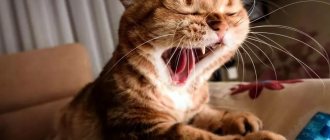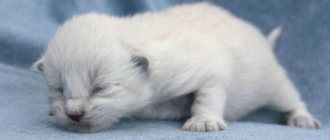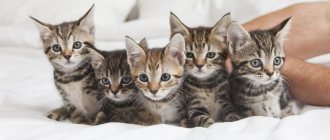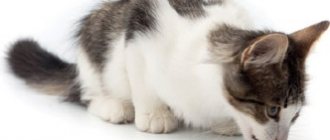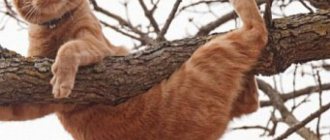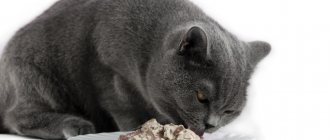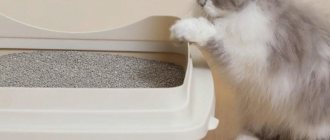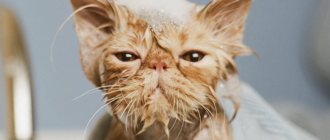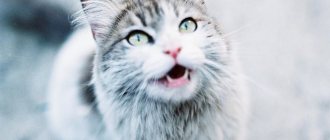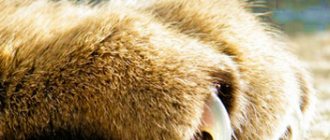The main reasons for frequent washing of a cat
Felinologists note that cats spend almost a third of their lives washing themselves. The main reasons for this.
Hygiene procedure
The cleanliness of pets is at a very high level. Cats wash themselves after sleeping, visiting the litter box, walking down the street, even after interacting with humans.
Washing is often accompanied by biting off irritants invisible to humans. But this is not necessarily a louse or a flea; this is how pets cleanse skin impurities.
Combing
Cats have a hard and rough tongue. Therefore, after a thorough wash, pets look well-groomed and combed. At the same time, they lick the fallen hairs from the fur, which settle in their stomachs. This can lead to the formation of hairballs and complications of the gastrointestinal tract.
In nature, wild cats know the need to regularly cleanse their food tract and eat special grass in order to expel the contents of their stomach. At the same time, they unmistakably know when the right moment has already arrived.
It is sometimes enough for pets to be given a special paste, a treat, or fed with grass, which is sold for this purpose in pet stores.
Also read: Why cats are afraid of water and what to do about it.
Preparing for the hunt
After the owner strokes the cat, it smells a foreign odor. And, as a born hunter, the pet is always ready to stalk prey. Moreover, the animal can do this for several hours, licking itself regularly. This is already a kind of masking of one’s own fluids.
It has been noticed that cats lick themselves more thoroughly and longer than males. This is also explained by the hunting instinct. After all, it is the females in any pride who are the best breadwinners.
Optimal body temperature
Cats constantly lick themselves regardless of the weather, but they do this especially actively when it is extremely hot or cold. At the same time, pets adjust their thermoregulation in a certain way.
At high ambient temperatures, the wool is moisturized and fluffed, the air between the hairs helps cool and protect the skin.
In winter, animals lick themselves so that the fur lies tightly, hair to hair, providing maximum protection from hypothermia.
Moisture protection
By moistening the fur with their tongue, cats not only trigger the thermoregulation mechanism, but also form a kind of water-repellent layer on the fur.
At the base of the hair there are glands that produce a special oil secretion - sebum. By evenly distributing it over the skin, animals give their fur protective properties.
In some breeds this ability is more developed due to genetics. These are, for example, the Turkish Van or the Norwegian Forest - natural hunters and fishermen. They can bathe without fear of their fur getting wet.
Communication
Despite the fact that cats are loners by nature, they communicate remarkably well with their fellow animals and with other animals through licking. They not only help each other wash hard-to-reach places (head, back, neck), but also exchange scents and show signs of attention and affection.
Rutting cats happily lick their friends, leaving a kind of mark on them. Nursing females wash their offspring all day long, not only performing hygiene and massage procedures, but also expressing love for the kittens.
Stress
By licking themselves, cats perform self-massage of the body - after all, their tongue is an extremely developed muscular organ that can exert high pressure on the skin and areas of the body.
This promotes relaxation, decreased muscle tone, and relief from fear and the effects of stress.
A frightened or irritated animal, as soon as the imaginary or actual danger recedes, immediately begins to lick itself, as if removing all the negativity from itself.
Communication and communication through smell
Cats hunt from ambush
A cat does not need to maintain close connections with other members of its species. And when necessary, they successfully cope with all communication tasks through voice and gestures, because they do not need to convey too much information to each other. As for dogs, things are more complicated here. Herd life requires close communication with fellow animals, the transfer of a lot of information about oneself, and the ability to obtain maximum information about the moods and state of the surrounding individuals. This need becomes most significant during a hunt, when it is necessary to coordinate the actions of an entire group. Smells in canines play a significant role in communication; they complement the information that can be obtained in other ways - through vision and hearing.
By smell, dogs can distinguish between the emotions of surrounding pack members - fear, aggression. Each dog has its own individual “perfume”; the pack knows the location of each individual dog by smell. They do not need to bark or look for each other, which simplifies joint actions when hunting in a pack. The dog needs the smell, so it does not get rid of it by constantly licking its fur. She only cleans herself as needed. They simply do not have the built-in instinctive action associated with constantly maintaining cleanliness.
However, dogs are excellent at masking scents to confuse possible prey. Not only hunting dogs, but also domestic dogs willingly roll around in sewage, grass or soil in order to hide their smell and acquire the aroma that prevails in the surrounding area. Many other animals do the same thing, and not just predators. Many rodents also roll on the ground to mask their own smell. This is also an instinctive action, inherent from birth.
If the cat stops licking itself
In this case, very quickly her appearance becomes unkempt and unkempt. Giving up a natural habit always indicates serious problems and should cause concern to the owner.
Oral diseases
Often the reason for refusing to wash your face is diseases of the gums and oral cavity. For example, gingitis, the initial stage of periodontal disease.
An inflamed, red area appears around one or more teeth, and over time it becomes covered with ulcers and sores. Any movement of the tongue causes severe pain to the animal and, along with other signs such as putrid odor from the mouth, refusal to wash also indicates this unpleasant disease.
Arthritis of the joints
If a cat develops arthritis of the joints, any movement causes him pain. He washes himself less often and less effectively. If the front paw is affected, it is difficult for the pet to wash its face. But if the back hurts, then usually nothing prevents you from reaching the sore spot, and the animal will lick it especially long and carefully, trying to reduce the discomfort.
Excess weight
Obesity is another problem in modern pets, especially after spaying and neutering. If pets are not switched to proper nutrition after surgery, excess weight will inevitably appear in a few months.
In addition to changes in appearance and gait, insufficient washing is another symptom of this pathology. It is caused by difficulty in mobility and the clumsiness of overweight animals.
Stressful conditions
Sometimes a cat stops licking itself due to severe stress. This is, for example, how a young animal behaves when it changes its owner and place of residence. It has been noticed that a pet sometimes does not drink, eat, go to the toilet or wash itself for several days.
Usually, the patience and affection of a person helps the kitten cope with its depressed state and return to normal life.
Sometimes, out of fear and stress, a cat, on the contrary, begins to wash itself incessantly. This is also a reason to seek veterinary help. Your pet will most likely be prescribed sedatives.
Systemic and infectious diseases
If the cat has stopped licking itself, its fur looks greasy, dirty, this is accompanied by apathy and lethargy, loss of interest in food and games, you should immediately consult a veterinarian.
All severe infectious diseases and chronic pathologies fit this set of primary symptoms, and it is important to quickly establish a diagnosis and begin treatment.
Veterinarians note that in the presence of fleas, other external parasites, helminths, and allergic reactions, the pet, on the contrary, becomes overly active, even more irritable and constantly licks itself.
Hygiene and hunting of cats and dogs
Dogs hunt in a pack
In order to understand the details of this issue, it is necessary to pay attention to the lifestyle of both creatures. Cats and dogs are predators, but they have different hunting strategies. Dogs are canines and are related to wolves. Like wolves, they prefer to stay in a pack, and they also hunt in packs, driving down prey. They do not need to hide or hide their scent, since they do not lie in ambush, pursuing prey openly.
Cats hunt alone. The only exceptions in this regard are lions, who live and hunt in prides. A cat is a lone hunter who lies in wait for his prey in ambush, and therefore is forced to act secretly. She needs to hide her own scent so that her prey does not sense her presence until the very last moment.
Interesting fact: lions are an exception in the cat family; they differ from other large and small cats in a number of ways. They do not know how to retract their claws, live in families, and actively pursue prey. They also do not wash themselves as often or as thoroughly as domestic cats.
Folk signs about a cat washing itself
There are many signs associated with washing a cat:
- If a cat washes its back and tail, there will be rain and bad weather, cheeks and nose - to clear and sunny weather.
- When a cat rubs its face with both paws, you need to track which direction it turns its head, since it is from there that the strong wind will soon come.
- If a pet washes its left ear, a woman will soon come to visit, and the right ear, a man will come to the house. The cat’s paws at this moment are warm - relatives will come, cold - to unexpected visitors.
Animal cleanliness and health
Sparrow dust baths
Every animal has innate skills to keep its body clean. Many birds take dust baths to get rid of insects; in winter, most warm-blooded creatures roll in the snow to clean their fur or feathers. Every animal strives to keep its fur clean because its survival depends on it. Dirty wool not only reveals the smell, but also does not protect well from cold or heat. If an animal stops performing instinctive actions to keep itself in order, this is evidence of serious trouble. Most likely, this creature is sick. And vice versa, well-groomed, shiny coat symbolizes the well-being and health of the animal. This applies to cats, dogs, and all other living creatures.
Thus, the cat constantly licks itself in order to mask its smell, which serves as a serious hindrance when hunting from ambush. Dogs do not hunt from ambush; they do not need to hide their scent so seriously. Dogs also need a personal smell, it provides additional opportunities for communication within the pack, while cats interact with their own kind less closely, they do not need smell for this. Self-care is an instinctive action; the animal does not need to learn how to do it. Every kitten knows that he needs to wash himself. The puppy is more inclined to wallow in the grass or snow, masking its smell.
Signs for guests
What does a cat do:
- washes right in front of the front door or on the threshold - expect guests soon (if you touch a cat’s paws, you can find out how desirable these people are to you: a warm pillow speaks of friends, a cold one speaks of those you don’t really want to see).
- carefully and for a long time washes the entire face (nose, ears, eyes, “cheeks”) on the right side - expect a man, on the left - a woman;
- licks itself defiantly in a visible place when the family sits down for breakfast - an occasion to show hospitality will soon arise, leave some kind of treat in the refrigerator in reserve.
Japanese traders have a sign: a cat washes its ear with its left paw - buyers will arrive.
Why do cats stop licking their fur?
Licking fur is a natural need for cats. Therefore, if you notice that the cat has stopped looking after itself, take a closer look at the animal. Refusal to undergo a regular procedure may indicate a number of ailments:
- inflammation of the gums or teeth;
- excess weight, which does not allow the animal to reach all parts of the body;
- arthritis of the joints, causing pain when changing body position;
- excessive stress, against the background of which the animal simply forgets about the regular procedure.
There are also opposite situations when cats begin to lick themselves too intensively. Such behavior, which is unusual for animals, may indicate that they have allergic reactions that cause discomfort, or that there are parasites in the body.
How a Bengal cat washes itself: video
Refusal to lick always indicates the presence of certain problems with the health or mental state of the cat. The animal looks unkempt and unkempt. Let's look at why pets may stop washing themselves.
Gingivitis or the initial stage of periodontal disease often lead to the cat refusing to lick. Inflamed, ulcerated gums in the area of the teeth cause severe pain when washing, which leads to a gradual abandonment of this habit.
For your information. Diseases of the gums and mouth are usually accompanied by a putrid odor from the mouth.
Arthritis
Any movement of the paws with arthritis causes joint pain. The animal tries to avoid painful sensations and, accordingly, tries to lick its fur coat as little as possible.
Obesity
Obesity is the scourge of castrated and sterilized animals. Improper nutrition leads to a sharp increase in body weight, and increased body weight makes domestic cats lazy and sluggish. Victims of excess weight wash themselves much less often than their lean counterparts.
Be sure to read:
A cat licks a person’s hands and face: 5 reasons what to do, why a cat constantly licks itself
